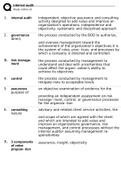internal audit
Study online at
https://quizlet.com/_2l4cub
1. internal audit independent, objective assurance and consulting
activity designed to add value and improve an
organization's operations. independence and
objectivity, systematic and disciplined approach
2. governance the process conducted by the BOD to authorize,
direct,
and oversee management toward the
achievement of the organization's objectives.It is
the system of rules, prac- tices, and processes by
which a company is directed and controlled.
3. risk manage- the process conducted by management to
ment understand and deal with uncertainties that
could affect the organi- zation's ability to
achieve its objectives
4. control the process conducted by management to
mitigate risks to acceptable levels
5. assurance an objective examination of evidence for the
purpose of
providing an independent assessment on risk
manage- ment, control, or governance processes
for the organiza- tion
6. consulting advisory and related client service activities, the
nature
and scope of which are agreed with the client
and which are intended to add value and
improve an organizations governance, risk
management, and control processses without the
internal auditor assuming management re-
sponsibilities
7. 3 components assurance, insight, objectivity
of value
proposi- tion
1/
, internal audit
Study online at
8. https://quizlet.com/_2l4cub
insight Internal
auditor acts as a catalyst for improving
an organi- zation's effectiveness and efficiency
by providing insight and recommendation based
on analyses and assess- ment of data and
business processes.
9. objectivity
2/
, internal audit
Study online at
https://quizlet.com/_2l4cub
With commitment to integrity and
accountability, internal auditor provides value to
governing bodies and senior management as an
objective source of independent ad- vice.
10. auditing vs ac- accounting collects, classifies, summarizes and
counting commu- nicates data, as well as measures and
communicates business events and conditions.
auditing considers business events and
conditions also but does not have the task of
measuring or communicat- ing them. they review
them for propriety. it is analytical and
investigative
11. Risk the effect of uncertainty on business objectives;
risk mgmt refers to the set of coordinated
activities to direct and control an organization to
recognize opportunities while management
negative events
12. compliance adherence to policies, plans, procedures, laws,
regula-
tions, contracts of other requirements
13. corporate values/goals are established and communicated,
gover- nance accom- plishment of goals are monitored,
accountability is en- sured, and values are
preserved
14. governance
um- brella board of directors up top- they have strategic
direction, governance oversight
15. role of the
Board in to identify the stakeholders of an organization,
Governance under- stand the needs and expectations of the
stakeholders, identify the potential outcomes
that would be unaccept- able to key
stakeholders
16. different types
of outcomes financial, compliance, operations, strategic
3/





